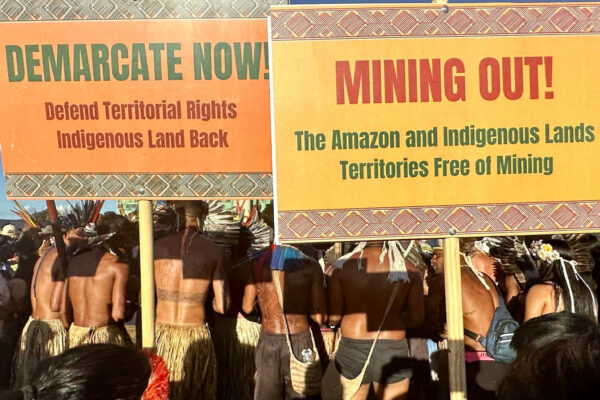The Bush Administration has proposed $98 million in military aid to protect Occidental’s Cano-Limon pipeline in Columbia, despite its environmental and economic liabilities. (part two of a two-part article)
SocialFunds.com – Corporate oil development often serves as the hub of an axis around which revolve such contentious issues as environmental degradation, indigenous land right conflicts, military protectionism, and corporate welfare. All of these elements converge in Occidental Petroleum’s (ticker: OXY) oil development in Colombia. (Click here to read part one.)
This February, the Bush Administration proposed a $98 million budget to train and equip Colombia’s 18th military brigade to protect the Cano Limon pipeline. The 480-mile pipeline, in which Occidental owns a 44 percent interest, runs through sacred ancestral land of the U’wa. The U’wa are an indigenous people who have continuously opposed oil development in Columbia because of the environmental damage that has resulted.
“The pipeline is buried underground along almost its entire route,” said Occidental Vice President of Public Affairs Larry Meriage, “so that it would have minimal impact on the environment.”
Despite this precaution, the pipeline serves as a target for sabotage. Guerilla groups have attacked it more than 1000 times since its 1986 construction, spilling more than 2.9 million barrels of crude oil (eleven times the amount spilled by the Exxon Valdez) and polluting 1,625 miles of river, according to the Colombian Environmental Ministry. Last year alone, guerillas bombed the pipeline 170 times, rendering it inoperable for 266 days and depriving Occidental and the Colombian government, which owns a 50 percent interest in the pipeline, of more than 24 million barrels of crude oil.
U.S. humanitarian workers traveled to Colombia to assist the U’wa in resisting Occidental’s encroachment. Ironically, three of these workers became victims of violence when members of the Revolutionary Armed Forces of Colombia, a leftist guerilla organization known by its Spanish acronym FARC, kidnapped and murdered them in early 1999.
Late last month, U.S. Attorney General John Ashcroft announced the indictment of the FARC for the “terrorist murder” of Terence Unity Freitas, Ingrid Washinawatok, and Lahe’ena’e Gay. Friends and family of Mr. Freitas immediately issued a statement condemning what they perceived as manipulation of his murder for political leverage.
“We are dismayed to see the Administration’s cynical and exploitative use of Terence’s murder to justify further U.S. military aid to the Colombian armed forces, aid the President has slated for training the Colombian troops to defend a beleaguered Occidental oil pipeline,” they said. “Employing Terence’s death as a means to continue perpetuating violence in Colombia grossly contradicts everything Terence believed in,” they continued. “[W]e object to twinning the pursuit of justice for Terence’s murder with the pursuit of the war on terrorism.”
Amazon Watch, a Los Angeles-based non-profit that helps defend the environment and indigenous people’s rights in the Amazon Basin, points out that this aid package primarily benefits Occidental. U.S. taxpayers will be subsidizing Occidental’s security expenses at the cost of $24 per barrel of oil, based on last year’s level of U.S. oil imports from Cano Limon, according to Amazon Watch. Furthermore, the package represents a major policy shift from U.S. military aid to combat the drug trade to protection of corporate interests, which critics consider even more dubious than the unsuccessful war on drugs.
“It’s a very unprecedented corporate subsidy,” said Amazon Watch oil campaigner Kevin Koenig. “It looks like Occidental may be in line to receive their own private Colombian army to protect their pipeline, and it’s taxpayers that are going to pay for it.”
Further militarization is more likely to escalate than to end the cycle of violence inherent in Colombian oil development, according to Mr. Koenig. In this region, oil development and violence are synonymous.
Neither the U.S. Department of Justice nor the White House returned repeated calls from SocialFunds.com soliciting their perspective.
Mr. Meriage stated that it continues to make sense for Occidental to operate the Cano Limon pipeline, despite the economic and environmental liabilities. It is unclear whether or not Occidental’s opinion is supported by a cost-benefit analysis that factors in the U.S. government’s generous support.













